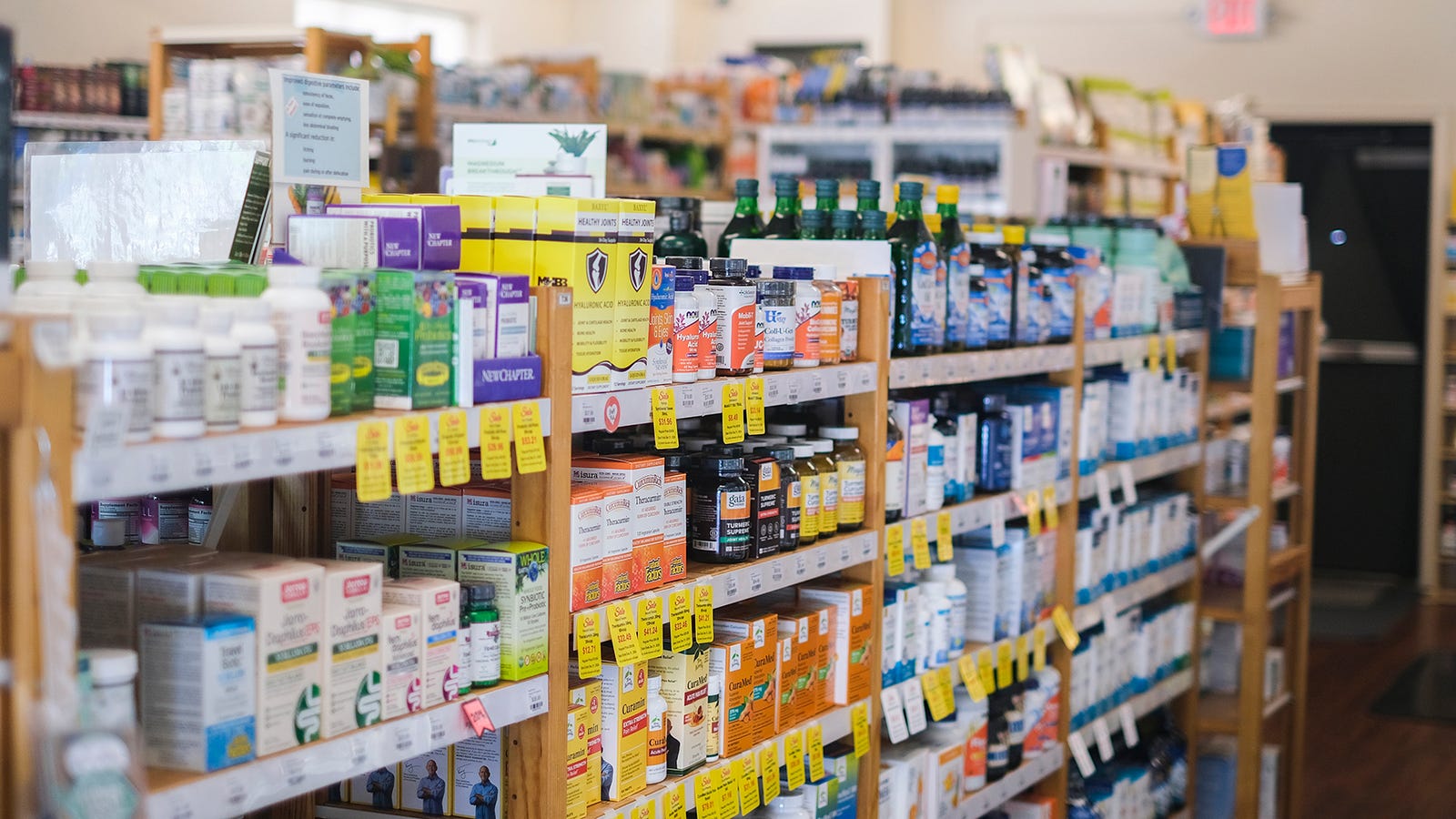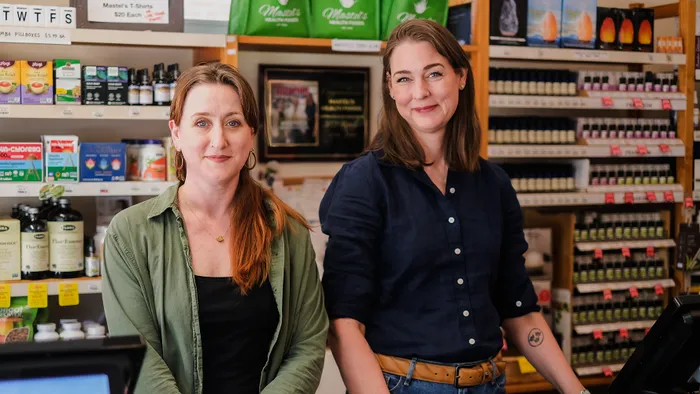This article originally appeared in New Hope Network.
Mastel’s Health Foods opened in St. Paul, Minnesota, in 1968, but then-owner John Mastel stepped away around 2000 to work his orchard and experimental farm.
At a Glance
- Operating the store throughout the COVID-19 pandemic convinced the women they should be its next owners.
- Even before their purchase of Mastel’s, Lauren Gaffney expanded the product selection, taking a chance on a $20 yogurt.
- Alina Hornfeldt modernized the marketing, added Instagram and started making reels about specific aspects of the store.
Mastel’s Health Foods in St. Paul, Minnesota, is one of the oldest traditional health food stores still rocking today. John Mastel, a pioneering proponent of herbs and other supplements, opened the tiny urban outpost in 1968, back when this stuff was largely considered, well, wacky. But Mastel, who’d finally recovered from a monthslong illness once he explored holistic therapies, became a firm believer in natural products and wanted to guide others toward better health too.
Mission accomplished. Though the founder, now in his late 80s, has long since retired, his novel shop remains a revered community institution and trusted resource for all things wellness. And now, thanks to two dedicated, passionate businesswomen, Mastel’s Health Foods will stay that way for many years to come.
In March 2023, the store’s longtime general manager, Lauren Gaffney, and marketing manager, Alina Hornfeldt, bought the business and building from Mastel. As leaders, the two have held true to the retailer’s roots while also evolving and innovating to better serve the community. Now as co-owners, they are cultivating stronger connections with fellow business owners locally and independent natural products retailers nationwide.
Here, Gaffney and Hornfeldt share more of their story.
How did each of you end up at Mastel’s?
Lauren Gaffney: I started here in 2002 while going to college. By 2006 or 2007 I was purchasing manager, and in 2019 I became general manager. There were a couple of breaks over the years, including when my daughter was born.
Back then, did you envision making this your career?
LG: Not necessarily, but my mom was part owner of a grocery store, and I started working there as a teenager. I just loved it. It was fascinating what people would come in and talk to us about. I loved learning about the products. Working at Mastel’s, I kept thinking that eventually I’d figure out what to do with my life. I tried a few other things, but I always came back here. It fulfilled me like nothing else.
How about you, Alina?
Alina Hornfeldt: Lauren and I have been best friends since 2005, when we met working at Axman Surplus in St. Paul. I had worked in a lot of retail positions over the years, and I got into general managing there. Then I had my son and took time off from work.
Then in 2017, with my son going into kindergarten, I wanted to get back into a career. Lauren came back from Expo West that year and was like “Oh my gosh, we don’t have Instagram, our Facebook is dead and our website is old. All the brands are asking about this stuff, and it’s stressing me out!” I said, “Hey, I love that stuff, so how about I come in part-time to help?”
LG: I hadn’t been to a trade show since 2012, and a lot had changed! Our advertising was a coupon I designed in Microsoft Word and sent to the local paper, and that worked fine. But the landscape had changed. We’d never had anyone dedicated to marketing, but I realized that to stay ahead of the ball, we needed to create this position.
Well, that clearly worked out!
AH: Yep, so I took care of that, and then as I’m here part-time, all my little retail-management things came out. I couldn’t hold back! I love shopkeeping and helping people. I’m an extrovert, so talking to new people all day every day was great. Plus, I got to work with my best friend. The ball just kept on rolling. I took over the social media and in-store advertising and started working with brands on co-op advertising and bringing in fresh ideas.
Merchandising was a priority for me too. We had a lot of older customers, which is awesome, but we needed to bring in younger people. Wellness was just starting to grow, and I was big into mommy blogs, natural parenting and all that stuff, and I was like, we need to get these people!

About 80% of Mastel’s Health Foods’ sales come from dietary supplements, according to co-owner Alina Hornfeldt.
So you started trendspotting and modernizing inventory?
AH: We went to Expo West in 2018, and I was like, “There is this amazing yogurt called Coconut Cult—everyone’s obsessed with it; we have to bring it in.” Lauren was like, “Nobody is going to buy $20 yogurt, Alina. That’s crazy.” I was like “No, no, it’s going to be amazing!” So, we brought it in as a direct line from Expo. We were the only place in the Midwest you could get it, and people drove here from all over.
LG: We sold out that weekend! The owners know us personally because we’ve been with them so long and have fostered that relationship. Coconut Cult is in Whole Foods and Erewhon now, but they still send us some exclusive flavors. So, we hold our own here in what’s not really flyover country.
AH: We were also early adopters of functional beverages, so we became a destination for those as well. From trendspotting, I was seeing that these new drinks were huge and going to be massive. So, right after we bought the business, we purchased a new cooler and freezer set and opened more space for functional beverages.
Let’s back up. Before you became co-owners, was John Mastel involved with the store at all anymore?
LG: He hadn’t worked here for many years, but customers remember him fondly and still ask how he is. John had a whole second passion: his orchard and experimental farm. So, around 2000, he transitioned to mostly working on the farm. He’d still come in once in a while to check on things. Around 2006, a family member began managing the store.
When did you start pondering buying the business?
AH: We managed the store through the pandemic on our own, without much oversight. We were making the tough decisions. It was a lot of stress, but we felt we could handle it. But then it was like, what’s going to happen to the store? There was no succession plan, and we knew somebody needed to step up. We were like, it should be us.
LG: Then in 2021 we got Vitamin Retailer’s Retailer of the Year. With that, we started to realize that we are doing this. We were empowered by getting that award, like, OK, we should make sure we can continue to do this for a long time. This store is such a resource for people, so we wanted to carry it on through the next iteration. That’s when we started figuring out how to buy a business.
AH: We were taking long walks, talking about what this would look like, how we were going to approach him and his family. John has a power of attorney, and that manager, a family member, had been hands on with the business and understood it. So, we approached the family in 2021. It took about 18 months start to finish.
What did the purchasing process entail?
LG: At the time, we had no roadmap or timeline. We just happened upon a blog by a local business that two longtime employees had just purchased from the original owner. We cold-called them and said, “Can we get you a cup of coffee and ask what you did?” They were so nice, and we really learned from them. They hooked us up with their business consultant. Then we found a lawyer and banker. We got involved in local small business organizations. Networking suddenly became a very big deal.
As co-owners, how have you put your own stamp on the store?
AH: We joke that it’s not under new management, just new ownership. The management style had been pretty well established by us already. We didn’t bring in uniforms or anything! We’ve been women run for a long time, and now we’re women owned too. We’ve had customers say the vibe here is pleasant, welcoming and safe, and some of that comes from being nurturing. It’s a priority for us to make it a welcoming, safe space where you can talk about the most vulnerable things going on in your life.
But on the industry side, we’ve gotten way more involved as business owners with SENPA, and joining [its] Emerging Leaders Council has been huge. We also joined the St. Paul Area Chamber. It’s just the power of networking and learning from each other and sharing resources.
You also joined INFRA, right?
AH: Yes, and INFRA had to change things for us. We had never met the membership requirements because we didn’t sell enough grocery, but they are based here, so they’d stop by all the time to see what we were doing. They started looking at how they could open up [the parameters] of what could be an independent natural food retailer. So, we were one of the first supplements-based stores that INFRA brought in.
LG: We helped them establish how a supplements store differs. INFRA is a buying group, so how can their programs benefit a store that is pretty minimal on the grocery side but heavy on the supplements side? It has been a great partnership because there aren’t a lot of small businesses in this industry nearby. INFRA has connected us to stores like us all over the country, which has been very valuable.
What is your sales breakdown?
AH: We’re still probably 80% supplements, 10% personal care and 10% food, which has increased with joining INFRA. We brought in the KeHE Everyday program, and the pricing we can offer is really competitive. Now you can put together a meal from our little grocery set.
Reflecting on your journey, what makes you proudest?
LG: I’m proud that this place still exists for the community, and it’s because we were willing to take a risk. We had some tough years and tough stuff we went through together. But this place didn’t go down on our watch, and we committed to keep it going for the indefinite foreseeable future.
AH: We saw this poll about who do Americans trust? Not politicians or corporations. They trust small businesses, and we’re a small business that’s health focused. Knowing that you make an impact in people’s lives is amazing. Respect and trust is a reciprocal relationship, and it feeds your soul.

